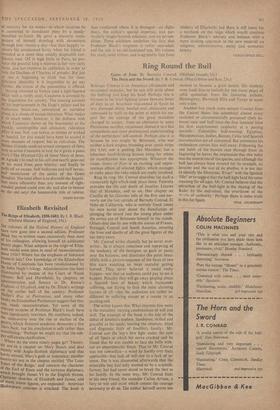Ring Round the Bull
Gates of Fear. By Barnaby Conrad. (Michael Joseph, 35s.) The Horn and the Sword. By J. R. Conrad. (MacGibbon and Kee, 25s.)
BARNA131' CONRAD 1S an American aficionado and occasional matador, but he can still write about the bullring and keep his head. Perhaps this is because in his brief fighting career between bouts of duty as an American vice-consul in Spain he was slammed about, bowled over, dislocated and concussed by bulls to the point at which his res- pect for the courage of the great matadors changed its nature: from an obeisance to some Pleistocene sacrifice, experience altered it to a less sympathetic and more professional understanding of the performers' self-control. Perhaps also it is because he was taught by Belmonte, who was neither a dark enigma brooding over comic strips like Litri, nor a godling like Manolete, but a laborious hard-thinking human being for whom no mystification was appropriate. Whatever the cause, Gates of Fear is an exciting and unpre- tentious album of selected fights, which manages to make plain the risks which are really involved,
Ring by ring, Mr. Conrad describes for each a memorable fight which took place there. Talavera provides the life and death of Joselito; Linares that of Manolete, and so on. One chapter on Castillo de las Guardas tells of the first and nar- rowly not the last corrida of Barnaby Conrad, El Nino de California, who is entirely frank about his own terror and about the humiliation of • plunging the sword into the wrong place under the severe eye of Belmonte himself in the stands. Others deal one by one with the arenas of France, Portugal, Central and South America, covering the lives and deaths of all the great figures of the last forty years.
Mr. Conrad writes clumsily but he never over- writes : he is always conscious and reproving of the tendency of the foreigner to gush or panic over the business, and illustrates this point beau- tifully with a picture-sequence of the faces of two film stars watching an inept matador getting horned. They never believed it could really happen—nor that an audience could pay to see it happen. Possibly they will go away gasping about a Spanish love of beauty which transcends suffering, not daring to face the most alarming feature of all—that the audiences are rather in- different to suffering except as a means to an exciting end.
The writer knows this. What interests him more is the matadors' varying combinations of will and skill. The triumph of the book is the tale of the debut of Joselito's nephew, handsome, skilled and graceful as his uncle, bearing the absolute, blind and dogmatic faith of Joselito's family : Mr. Conrad saw the boy's first fight under the eyes of all Spain at which his nerve cracked and he found that he was unable to face the bulls with- out an unpardonable flinch. That to Mr. Conrad was not cowardice—a word he hardly ever finds applicable—but lack of will due to a lack of in- terest. For it was discovered afterwards that the miserable boy had only wanted to be a scientific farmer, but had never dared to break the fact to his family. In the same way, Mr. Conrad finds in his own friend, the matador Carlos Arruza, a fury to win and excel which creates the courage necessary to do so. The author himself seems too
modest to become a great torero. His modesty even leads him to include far too many pages of solid quotation from his favourite authors, Hemingway, Havelock Ellis and Tynan to name only a few.
Another but much more earnest Conrad from the United States has assembled almost every recorded or circumstantially presumed clash be- tween man and bull since the first hominid blew his first experimental raspberry at a passing aurochs: Paleolithic bull-worship, Egyptian, Mesopotamian, Indian, Roman, Celtic and Spanish tauromachies are all compared. But sometimes his enthusiasm carries him well away. Following the one habit of the human race through from its beginning he leaves the impression that this habit was the central rite of the species, and although the bull has always been revered for its strength, its ferocity and the size of its phallus, it is not fair to identify the Dionysiac "Evoe!' with the Spanish 'Ole!' or to suggest that the bull-fight held the same meaning for all ages. Mr. Conrad believes that the attraction of the bull-fight is the slaying of the Ruler by the individual, the overthrow of the
of authority.' Perhaps there is some truth in this for Spain. NEAL ASCHERSON










































 Previous page
Previous page